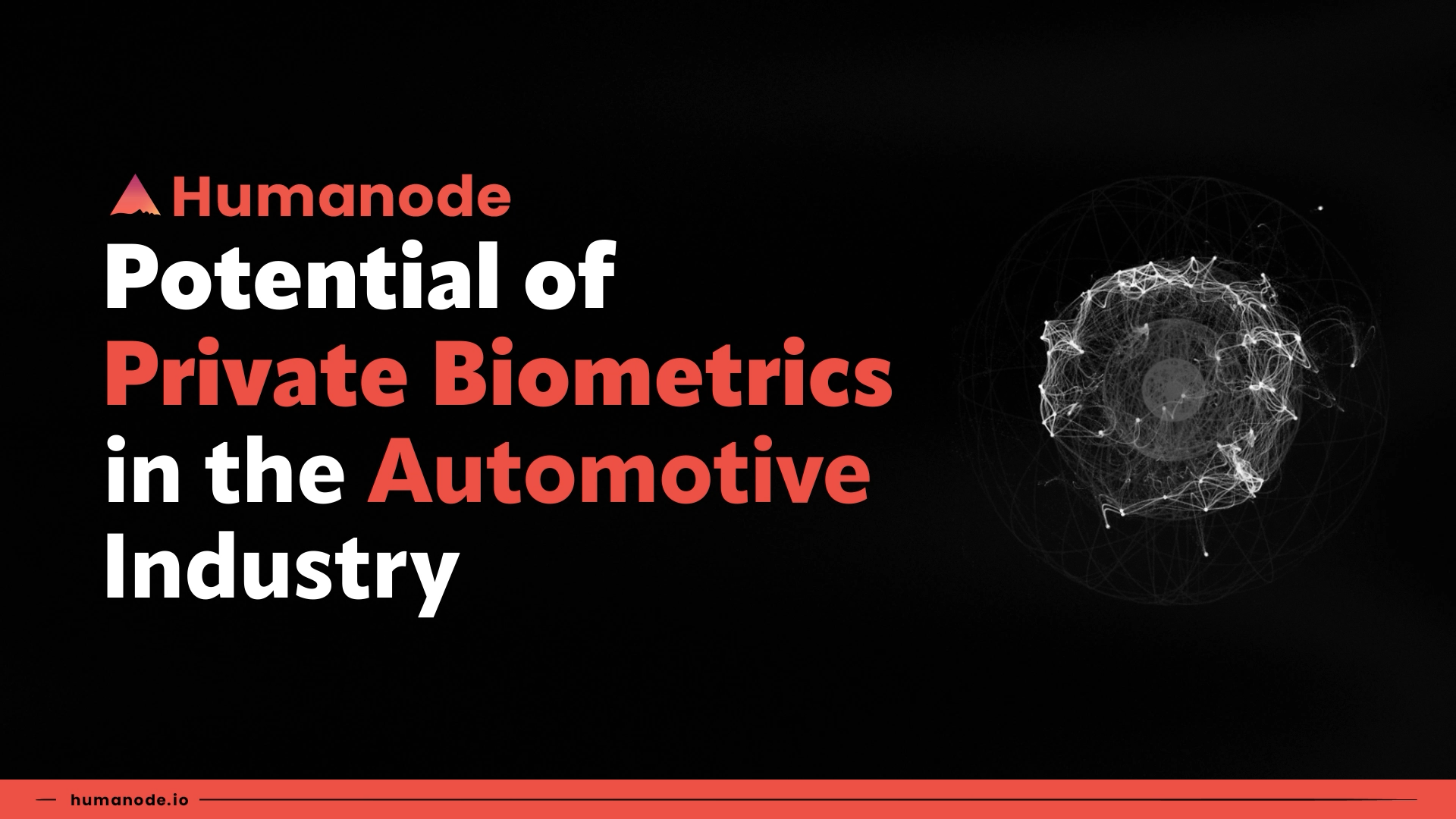Case study: Private biometrics and the automotive industry

With large global industries, such as the automotive industry, the use of private biometrics may not be the first thing that comes to mind as a match made in heaven.
But here are a few applications of the Humanode private biometrics that immediately come to mind.
In the modern day and age, mechanical car keys have in large been replaced by electronic solutions, keyless entry and push-button ignitions, and in some cases, even biometric keys using fingerprint technology.
At the same time, cars are “connected”, they collect data and send the data to the manufacturers.
Many of the cars that they have produced in the past 7 to 8 years collect and transmit specific data concerning the use of the cars. A majority of the data is what one would call “vehicle health data”, which in general is used internally for quality assurance, research, recall tracking, service issues, and similar unsurprising car-related purposes.
Then there is the “location data”, meaning where your car is. This data can be combined with emergency services in the case of an accident, or could be combined with marketing platforms.
And yes, the various manufacturers are taking it a step further to collect “driving data” or “driver behavior information”. For example, if the “vehicle health data” shows that the brake pads are deteriorating faster than expected, by combining that data with the “driver behavior information”, they can figure out if the problem originated from faulty brake pads, the manufacturing process, or if it was just a bad driver that slammed the brakes one too many times.
The goal is to create a connected car platform that can not only gather valuable data for the manufacturer but also eventually send the data back to the cars to assist the drivers.
The elephant in the room
Currently, the reputation of the automobile industry concerning privacy and data security, is pretty much as low as it can be. There are plenty of studies that conclude that “Modern cars are a privacy nightmare”. They collect way too much personal data, use it too freely, sell it too freely, do not offer enough control of the privacy options, and offer no evidence of how secure the data is, or if there is any security at all.
If a user does not want all of their private personal data, such as their every movement or action in their car to be sent to the manufacturer for harvesting, they are often allowed to “opt-out” of such data collection by contacting the “customer support center”. The problem here is that the manufacturer does not exactly want you to opt out.
“If you no longer wish for us to collect vehicle data or any other data from your Tesla vehicle, please contact us to deactivate connectivity. Please note, certain advanced features such as over-the-air updates, remote services, and interactivity with mobile applications and in-car features such as location search, Internet radio, voice commands, and web browser functionality rely on such connectivity. If you choose to opt out of vehicle data collection (with the exception of in-car Data Sharing preferences), we will not be able to know or notify you of issues applicable to your vehicle in real time. This may result in your vehicle suffering from reduced functionality, serious damage, or inoperability." Tesla's Customer Privacy Notice
Naturally, cars being “Hacked” is also a major problem.
There are plenty of applications, programs, and gadgets that float around in the dark web that are clear and present dangers. These hacks in general target telematic systems, automotive APIs, and infrastructure, and there have been plenty of cases where these hacks have unlocked and started cars, locked users out of remote vehicle management, and could even change car ownerships.
A solution? Introducing Humanode private biometrics.
What if Humanode private biometrics were used as the car key, or as an addition to it to enhance security? As in, not only to start the engine but to authorize and register the specific type of data collection from the cars that the user permits?
Although a system would need to be designed that would perhaps allow the owner to register a number of bioauthenticated users to a car, only allowing those users to unlock, start the car and drive it, but combining the owner’s Humanode private biometrics to a “car-key data token” is not as difficult as one would think.
Temporary keys could even be issued by the owner of the car, or car rental agencies. Once again, not a big challenge.
As the key is based on Humanode private biometrics, theoretically it would be much, much more difficult to hack the private biometric user data, considering the error rate is currently 1/125,000,000 for 1:1 matching, and the security of the technology is improving at an amazing rate.
Not only would private biometrics be a solution as a “car key” and “data key”, it could also solve the issue of getting accurate “long term data" and expand further business and/or customer service possibilities.
Currently, the data, including the “driver behavior data” is tied to the car. Sure, the data can most likely be “reset” to factory settings once the ownership of the car is transferred, but what if the private biometrics allowed the “driver behavior data” to be linked to a biometric data token, and not to the car? What if this data could be gathered and used without invading the privacy of the driver by making the biometric data token fully confidential so that no one has access to it?
Wouldn’t it be more beneficial for the driver to be able to “transfer” or “carry over” the “driver behavior data” to a new car to assist the driver better? Wouldn’t this also allow manufacturers a better idea of how they could improve their cars over the long term, without needing PII from the users? Would it not decrease the rates of car theft?
Loyalty programs
Another way that Humanode private biometrics could assist the automobile industry is with their “loyalty programs” or “owner clubs”.
Concerning loyalty programs, there is a massive stumbling block that the various manufacturers need to overcome in this global market. The keyword here is “global”.
The loyalty program for each manufacturer tends to be “local”.
If a user who had enjoyed the loyalty program for, say, in America for 10 years, moved to Japan, there are few loyalty programs that would “transfer” the benefits from one loyalty program to another.
The user data from one locality is rarely, if ever, transferred to another. If a user living in the US half of the year and in the EU the other half, owns cars in both locations and is a member of both loyalty programs, technically he or she is counted as “two users”. This may not sound like a big deal, especially if the manufacturer is only trying to gather marketing data so they can sell more cars.
But what if private biometrics allowed the creation of “global programs”?
What if the user data from the “loyalty programs” and the “driver behavior data” could not only be combined but benefit the user in whatever country they are in?
Not only could the loyalty programs could work with a global or even a decentralized confidential database, but the “loyalty program user tokens” could also be tied to the “car-key tokens”, not only allowing the transfer of the “loyalty token” and “driver behavior data” from car to car wherever the user is, but perhaps for, say, promoting safe or better driving by connecting the “driver behavior data” to targeted “drive smart” campaigns. “Fasten your seatbelt for at least 98% of the time for 50 uses for 100 free loyalty points!” or “Drive within the speed limit 85% of the time for one month for 1000 free loyalty points!” could be the campaigns for the future.
With the marketplace becoming more globalized, tools that are transcendent of the physical geographical, legal, and political landscapes become the key to success.
It is also true that the use of biometrics not only for security but for a heightened user experience is a need that all industries are coming to realize.
The question is, how far are the various industries willing to go to offer convenience, privacy, and security for their users? The fact of the matter is that users currently feel that whatever industry it is, corporations often see their users as “fresh data to harvest” to exploit.
Humanode offers private biometrics to enable secure and private Sybil resistance, and to strike the balance between protecting the privacy of biometric data and allowing impactful data for a majority of the various industries to be collected pseudonymously.
The only limiting factor of how private biometrics can be utilized is one's imagination.

